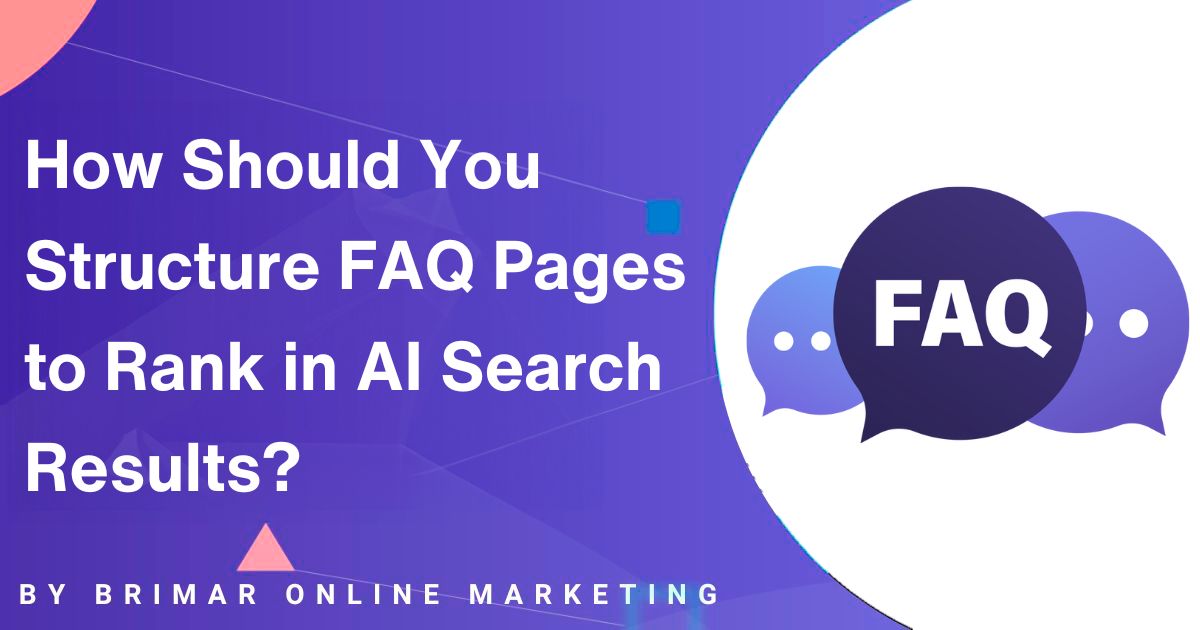
Why do FAQ Pages Matter More Than Ever?
People don’t search the same way they used to.
Instead of clicking around and scanning multiple web pages, they’re now asking full-blown questions into voice assistants, relying on AI platforms to summarize content, or getting their answers directly on Google without even clicking.
These zero-click searches are no longer the exception; they’re the norm.
The rise of AI search engines, generative AI tools, and large language models like Gemini and ChatGPT has shifted the way information is served.
Instead of only listing links, these systems now generate their responses by pulling from the most reliable, well-structured sources they can find.
And guess what they love?
FAQ pages.
Because they’re clear.
Straightforward.
Easy to crawl.
Easy to quote.
When done right, FAQ sections give AI systems exactly what they’re looking for: short, precise, high-quality answers to real questions.
Not only does this help your content get picked up in AI-generated answers, it also increases your chances of landing a featured snippet or a mention in Google’s AI overviews.
This is especially true with mobile users and voice searches, where people expect instant answers without digging.
They’ll ask their phone something like “how long does shipping take?” or “is this product gluten-free?” and your FAQ could be the one that gets read aloud or featured on top.
If you’re not already optimizing your FAQ pages for this kind of visibility, you’re leaving traffic, and likely sales, on the table.
What Makes a Great FAQ Page in 2025?
Not all FAQ pages are created equal.
The ones that win in AI-driven search results have a few things in common.
First, they’re built around a real FAQ section that anticipates the questions potential customers are asking.
This includes both general questions (like “How do I track my order?”) and product or service-specific ones (like “What’s the difference between Plan A and Plan B?”).
It’s not just about answering questions.
It’s about answering them well.
Your FAQ content should be written in natural language, not robotic or keyword-stuffed.
Think about how someone would ask a question out loud and respond in a tone that feels human, helpful, and clear.
AI platforms favor this kind of content because it mirrors the way users phrase queries.
This also plays a huge role in your broader SEO strategy.
When search engines, especially AI crawlers, scan your site, they’re looking for structured data, clarity, and accurate information they can trust.
A well-optimized FAQ page gives them just that, improving your visibility in both traditional search results and AI-generated summaries.
But it doesn’t stop there.
Effective FAQs can also boost your conversion rate.
When visitors land on your site, many are just looking for quick answers.
If you make them scroll or dig through blog posts, you might lose them.
But if your FAQ page is clear and easy to scan, you remove friction.
That builds trust and nudges them closer to a decision.
It’s also a powerful way to boost your online presence without constantly creating new content.
Think of it as a great place to repurpose the answers your team gives every day, whether in emails, chats, or sales calls, and turn them into SEO gold.
At the end of the day, if your content helps users find what they need fast, it helps your rankings too.
Start Attracting Customers Through SEO Today!
We can help you attract new customers through Tailored Search Engine Optimization Strategies for Your Business.
Step-by-Step Guide: Structuring Your FAQ Page for AI and Traditional SEO
1. Identify the Most Common Questions
An FAQ page is most effective when it addresses common questions.
The easiest way to find those questions is to look at what your audience tells you every day.
Customer service emails, chat transcripts, and even comments on your social media posts are goldmines for real, unfiltered queries.
Search data is another powerful source.
Check your Google Search Console to see which phrases bring visitors to your site and where you’re missing opportunities.
AI tools and AI chatbots can speed up this research by analyzing conversations and detecting recurring themes.
After creating a list, organize the items into different groups.
Some questions will belong on a product page, others on service pages, and some might fit better in blog posts.
Organizing by topic helps both visitors and search engines quickly find what they need.
2. Format Questions and Answers Using Natural, Plain Language
Think about how someone would ask a question out loud.
That’s the tone you want to capture, especially with the rise of voice assistant searches and AI-generated summaries.
Your responses should be concise, straightforward, and simple to scan.
Aim for the kind of response that delivers instant answers without forcing the reader to scroll through long paragraphs.
This style not only improves the user experience but also gives you a better shot at showing up in featured snippets and Google’s AI Overviews.
3. Use Proper Schema Markup
Schema markup explicitly informs search engines about the meaning of your FAQ.
Adding FAQ schema to your page can help it qualify for rich results, which often sit at the top of search engine results pages.
Structured data is essential for AI crawlers and large language models.
It helps them pull your answers accurately into AI-generated results.
Most content management systems have simple ways to add this markup without touching code, so it’s worth making it part of your publishing process.
4. Optimize for Both AI and Traditional SEO
AI search engines and traditional search engines use different methods, but both reward clear, relevant, and well-structured content.
Use relevant keywords, related terms, and your target keywords naturally within each FAQ answer.
Avoid stuffing; the goal is to make the text read like a conversation, not a keyword list.
Technical SEO still matters.
Fast load times, mobile-friendly layouts, and clean site architecture give your FAQ section a better chance to rank.
Combine these with smart digital marketing strategies, and you’ll improve your visibility across both AI platforms and traditional search results, keeping your content in front of potential customers no matter where they search.
Layout & Design Best Practices for Better AI Recognition

A well-structured FAQ page is like a welcome mat for both visitors and AI systems.
If it’s organized, clear, and easy to navigate, you’re giving AI crawlers and your audience the best possible chance to find what they need quickly.
Keeping your FAQs on a single page works well for smaller sets of questions because it lets AI models scan and understand the full context in one pass.
For businesses with larger volumes of questions, breaking them into modular sections by topic is a smart move.
That way, each section becomes highly relevant to a specific search intent, improving your chances in both AI search engines and traditional search results.
Position matters.
Placing your FAQ section near the top of the page or in a marked area tells both users and AI crawlers that this is important content.
On product pages or service pages, embedding key FAQs right under the main description is a great way to address potential customers’ concerns before they even think about leaving the page.
Mobile users now dominate search, so your FAQ layout has to be mobile-friendly, with fast load speeds.
Large images, clunky scripts, or unnecessary animations can slow things down, and slow sites lose visibility in search engine results pages.
Finally, don’t let your FAQ section be a dead end.
Use internal links to guide readers toward deeper resources in your knowledge base, relevant blog posts, or other service pages.
This not only improves user experience but also signals to AI crawlers that your site has a strong content network, which can help your overall SEO strategy.
How FAQ Pages Fit into Google’s AI Overviews and AI Search Engines
Google’s AI overviews and other AI-driven search results rely heavily on structured, relevant information.
When your FAQ content is well-organized and supported by FAQ schema, AI crawlers can instantly understand your answers and decide if they’re a good fit for inclusion in an AI-generated summary.
AI SEO isn’t just about ranking in traditional search engines anymore.
AI platforms and generative models look for content that delivers concise, clear, and accurate answers to the most common questions.
A well-built FAQ page naturally matches that format, making it a prime candidate for AI-generated answers.
This matters for organic traffic because AI-generated results often appear before traditional search results, especially in voice searches or zero-click searches.
If your FAQ content earns a spot in those answers, you’re meeting users exactly where they are, without them needing to scroll further.
Compared to long-form blog posts or general web pages, FAQ pages are more likely to be selected for AI results.
The reason is simple: AI systems prefer structured, predictable content that’s easy to interpret, and an FAQ’s list-of-questions format makes it perfect for that purpose.
When a direct, plain-language answer follows each question, it’s far easier for large language models to pull that snippet into a featured position.
This gives your brand a better shot at reaching the top of AI-driven search results, strengthening your search visibility, and building trust with potential customers who see your answers presented as authoritative by the AI platform.
Advanced Tips for AI Optimization

An FAQ page can either quietly sit there collecting digital dust or work like a 24/7 magnet for AI-driven search results.
The difference often comes down to how you maintain and optimize it.
Keep the content fresh.
AI models and search engines reward accuracy and recency, so update your FAQ content regularly.
New questions come up as products evolve, services expand, or customers find different ways to phrase their needs.
Treat your FAQ as a living resource, not a one-and-done task.
Even small updates can give AI crawlers a reason to re-evaluate and rank your page higher.
Test how your answers perform in AI search experiences.
Generative AI tools can simulate how your content might appear in AI-generated summaries, featured snippets, or direct answers.
This is a quick way to spot gaps or overly complex wording that could make your content less appealing to AI engines.
If the AI-generated answer from your page doesn’t sound like something you’d proudly share, refine it until it does.
Integrate with voice assistants.
Many potential customers use Google Assistant or other voice platforms to get quick answers.
Make sure your questions are phrased the way someone might ask them out loud, and keep the responses short and clear enough for a voice assistant to deliver without confusion.
This not only improves accessibility but also increases the odds your FAQ will be the source for those voice-triggered answers.
Common Mistakes to Avoid
Skipping schema markup is like building a beautiful store with no signage.
The FAQ schema tells AI crawlers exactly what’s on the page and increases the chances of earning rich results in search.
Without it, even the best answers can get overlooked.
Keyword stuffing still hurts more than it helps.
AI systems and traditional SEO algorithms are designed to spot unnatural language patterns.
Write in plain language, the way you’d explain an answer to a real customer.
If the wording feels forced, it will likely fail to connect with both humans and AI engines.
Don’t hide your FAQ section.
If it’s buried at the bottom of a long page or several clicks deep, it won’t get the attention it deserves.
Place it where it’s easy to find and link to it from related pages using clear internal links.
This not only helps users but also guides crawlers through your site structure.
And perhaps the biggest oversight is writing FAQs without thinking about the people who will read them.
Your target audience determines the tone, complexity, and focus of your answers.
If your content doesn’t speak directly to their questions and intent, even perfect technical SEO won’t get you the results you want.
The Future of FAQ in the Age of AI Search

A strong FAQ page today is more than a convenience for visitors; it’s a strategic tool for search engine optimization in an AI-driven world.
When built with clear intent, accurate information, and the proper technical structure, it becomes a bridge between your brand and both human readers and AI systems.
The best practices are straightforward: organize your questions well, keep the language natural, apply schema markup, and link internally to related resources.
Regularly update your content to keep it relevant and trustworthy, and consider how voice assistants and AI tools will interpret your answers.
An FAQ page is a great place to boost visibility, handle common customer service questions before they hit your inbox, and position your brand as a reliable source for AI-generated answers.
Well-crafted FAQs don’t just sit on your site; they show up at the top of search results, win featured snippets, and help you stay visible in AI search engines.
If you aim for that top spot, consider your FAQ page as a valuable long-term asset.
Keep it updated, make it easy to navigate, and give both your audience and AI crawlers the best answers they can find.
Our SEO Services Have Helped Our Clients Increase Their Revenue!
“I highly recommend Brimar if your looking to grow your online business. You will be satisfied with the high level of expertise and high quality of services. It has helped my business grow by leaps and bounds.”
CEO

